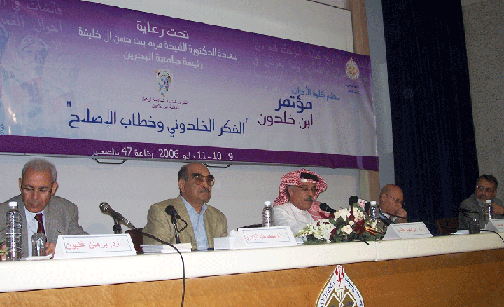
[left to right, Burhan Ghalioun, Muhammad ‘Abid al-Jabri, Ibrahim Gholum, Fahmy Jad’an and Abu-Ya’rab al- Marzouqi at University of Bahrain Ibn Khaldun conference in May]
The theme of “reform†in its socio-economic, political, religious, and ethical dimensions has been, for the last five years, a topic of greatest contention and debate in the Arab World. This theme was recently extensively deliberated in a conference entitled “Khaldunian Thought and the Discourse of Reform†in celebration of the 600th anniversary of Ibn Khaldun, the erudite Arab thinker, scholar, politician, and historian of the 14th century. Sponsored by the College of Arts at the University of Bahrain, it hosted renowned contemporary scholars including Muhammad ‘Abid al-Jabri, Burhan Ghalioun, Fahmy Jad’an and Abu-Ya’rab al- Marzouqi, among others.
I do not intend to make a summary of the conference, but rather highlight core issues related to what I call here “Post-asabiyya“, to indicate new perspectives and viewpoints opposing and transcending Ibn Khaldun’s widely-known concept of asabiyya, group cohesion and solidarity based on blood relationships (and common interests) within particular groups. To do something significant, including reform, requires going beyond asabiyya. Put differently, to attain an overall political, social, and economic reform, the Arab World must liberate itself from the past asabiyya and live in a post-asabiyya era in the sense that the ruler must consult the ruled – or the people – and not just the aristocratic consensus, before making critical decisions or taking serious actions.
Arab societies are not prototypical and the conditions within each society change with the change of the times. Ibn Khaldun discussed tribes and tribal solidarity; Arab societies now experience differing sources of solidarity stemming from common ideologies, class-consciousness, the common struggle for a better life, and the political solidarity emanating from specific affiliations within civil society.
While Ibrahim Gholum, Dean of the College of Arts who initiated the conference, suggested three key terms to be discussed (namely reform, civil society, and the relationship between religion and state), Mohammad ‘Abid al-Jabri, an authority on the subject of Ibn Khaldun, surprised the audience by saying that the heading of the conference should read “Ibn Khaldun and the Despair of Reform†to highlight the fact that Ibn Khaldun never addressed the issue of reform. Ibn Khaldun’s pessimism and cyclical view of history had to do with his emphasis on the rise and fall of the state because of the asabiya, which he considered a dominant force of change, not reform per se. For Ibn Khaldun there is neither a consistent strategy by which individuals can achieve perfection nor an ongoing by and large order within which to maintain and extend the acquisitions of the past.
States and civilization arise through the power of asabiyya, but once those attain the levels of dominion and luxury that lead to corruption, they are destroyed and replaced by other groups of powerful asabiyya. Al-Jabri accentuated that Ibn Khaldun’s own lack of asabiyya was behind his political failure, and consequently led him to generalize this experience to the whole of Arab history. Al-Jabri further referred to what occurred in Bahrain five years ago as an example of surpassing the asabiyya. He emphasized that the transformation from an emirate to a kingdom, as in the case of Bahrain and earlier in Morocco, can be considered a genuine threshold and liberation from asabiyya, as well as an enactment of reform. It is a change from a rule based on the will of one person (the ruler or emir), to a state of institutions and laws in which people are granted constitutional rights. But such a case is still a liminal stage toward full reformation in all aspects. This statement brought criticism from the audience, especially Munira Fakhro of the University of Bahrain, who argued that some emirates, such as Kuwait, are governed by institutions. Al-Jabri maintained, however, that there are two different meanings of reform: one indicates repair or patching which is temporary or transitory, the other signifies reconstruction or reconfiguration that that can be represented specifically in the transition from tribal asabiyya to nationhood or kingdom. Meanwhile, Baqer al-Najjar, professor of sociology at the University of Bahrain, raised a question concerning the willingness of grassroots or people to respond positively to overall reform initiated by the state. In his response Al-Jabri differentiated between two kinds of change one gradual coming from the top (reform), the other abrupt coming from the bottom (revolution). He indicated that the gradual reform is necessary to move from asabiyya toward modernity.
El-Sayed el-Aswad
University of Bahrain